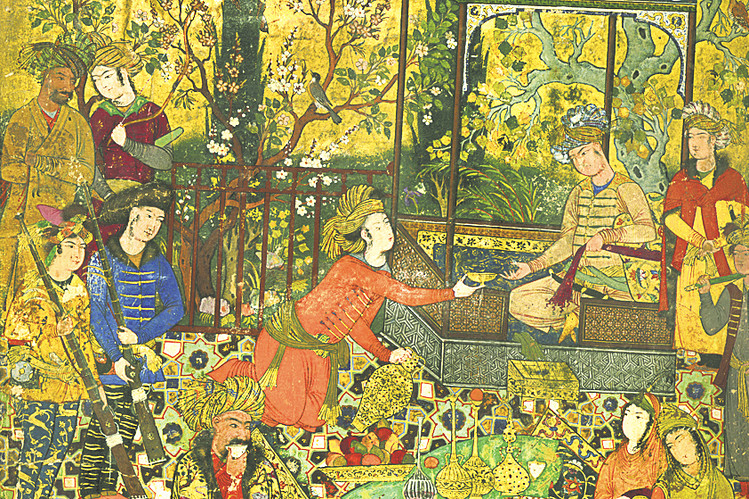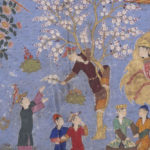
The subject of the ḥūr al-‘ayn (‘the wide-eyed beauties‘) occupies a large space in Islamic belief, and opinions about them are contradictory. The shaykhs of Islam – primarily the Salafist and Wahhābi shaykhs among them – were in general greatly interested in this theme, along with researchers, writers and preachers, while the more enlightened and rational public had another opinion. Here I will just provide some illustrations on this controversial topic.
BY YUSUF YUSUF
THE ḥūr al-‘ayn theme populates most Islamic sources and references, and here I will just summarise these by focusing on two verses from the Qur’ān along with commentaries on them, and two hadiths from the Messenger of Islam, to conclude with my own reading of this.
In the Qur’ānic text the following verse is given:
And We shall wed them unto fair ones with wide, lovely eyes. [1]
Al-Ṭabarī’s commentary on this runs as follows:
The Almighty says: Just as we bestowed honour upon these pious people in the Hereafter by bringing them into Paradise, and dressing them in silks and brocades, we also honoured them by marrying them there to the women there who are ḥūr, those who are pure and white. The singular form of this word is ḥawrā’. Mujāhid used to say, referring the meaning of ‘ḥūr’ in the phrase And We shall wed them unto those that are ḥūr of eye that it meant ‘we have wedded them to the white-skinned ones’.[2]
He goes on to say that
The ḥūr are those who confound (yuḥār) the gaze, [so fair that] the marrow of their calves can be seen from beneath her clothes, their skin so delicate that one can see one’s own face reflected in their livers.
This is how Mujāhid described the term ḥūr. But as for ‘those who confound the gaze’, this is has no meaning as regards Arab usage, for ḥūr is simply the plural of ḥawrā’, like ḥumr (‘red’’) is the plural of ḥamrā’ and sūd (‘black’) is the plural of sawdā’. Ḥawrā’ is simply the fa‘lā format of the word ḥūr, and means ‘pure white’.
As for the second verse: Pure ones confined to the pavilions,[3] the Tafsīr Muyassar runs as follows:
Pure ones confined (maqṣūrāt) to the pavilions, that is imprisoned in tents of pearl, who have adorned and prepared themselves for their husbands, yet this does not prevent them from going out into the orchards and gardens of paradise, as was the habit of the daughters of kings and the like.
The ḥūr, as I mentioned, are simply the plural of ḥawrā’, that is beautiful women with pronounced whites of their eyes, and pronounced black pupils. The ‘confined ones’ (maqṣūrāt) are those who are secluded in their homes and who have ‘confined’ themselves to their husbands. They keep tight to their home, a featured considered to define the best of women.
Many researchers and even shaykhs of Islam have denied that any sexual relations take place in Paradise
The online site Islamweb features two hadiths of the Messenger of Islam on the subject of the ḥūr al-‘ayn taken from two Ṣaḥīḥ collections of Muslim and al-Bukhārī – the hadith of Abū Hurayra:
The first batch to enter Paradise will appear like the moon of a night that it is full, they do not spit, nor do their noses run, nor do they defecate. Their vessels are of gold, their combs are of silver and gold, their perfume is of Aluwwah, and their sweat is musk. Each one of them has two wives, so beautiful that the marrow of their shins can be seen through the flesh. There is no differing among them nor mutual hatred, and their hearts are like the heart of one man, and they glorify Allah morning and evening.[4]
A second hadith narrated from Anas ibn Mālik from the Prophet runs:
A single endeavour (of fighting) in Allah’s Cause in the afternoon or in the forenoon is better than all the world and whatever it contains. A place in Paradise, be it as small as the bow or one of your lashes is finer than all the world and whatever is in it. And if a woman from Paradise were to appear to those on earth, she would fill the space between Heaven and the Earth with light and pleasant aroma, and her head cover would be finer than the entire world and all it contains.[5]
Opinions on denying that there are sexual relations in Paradise
Many researchers and even shaykhs of Islam have denied that any sexual relations take place in Paradise. Dr. Anwar Mājid ‘Eshki President of the Middle East Centre for Strategic and Legal Studies went so far as to say that the ḥūr al-‘ayn are not for any sensual pleasure, since sexual urges do not exist in Paradise and Adam was not expelled therefrom until after his evil was discovered. The enjoyment of the ḥūr al-‘ayn is therefore not a sexual enjoyment but a moral enjoyment, one that our worldly minds cannot comprehend. ‘Eshki explained in an article for the Friday supplement The Message that he had taken up the topic for two reasons:

Suggested Reading
Firstly because of the exploitation of young teenagers by terrorists suggesting that if they carried out a suicide operation to kill and destroy they would become martyrs, and if they died they would receive the ḥūr al-‘ayn in Paradise;
Secondly, that a number of students and senior intellectuals were believing in the existence of sexual relations in Paradise and, he went on to add, that some had acted so abusively as to write a book to whip up a fascination with this nihilistic perception. He noted that the never aging youths waiting upon them mentioned in the Holy Qur’ān[6] were intended for the inhabitants of Paradise who, during their time on earth , had been inclined towards sodomy , and that this promise was designed to prevent them from indulging in that perversion – that God will reward them in Paradise with never aging youths – and it is this that has distorted the image of Paradise is in the minds of Muslims, and become a source of ridicule in the eyes of their enemies.
[1] Qur’ān XLIV (al-Dukhān), 54.
[2] Tafseer At-Tabari: 23/76
[3] Qur’ān LV (al-Raḥmān), 72.
[4] Ṣaḥīḥ al-Bukhārī, 3245.
[5] Ṣaḥīḥ al-Bukhārī, 2796.
[6] Qur’ān LVI (al-Wāqi‘a), 17.
